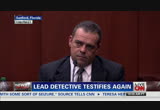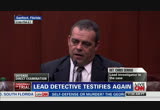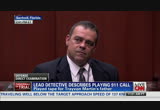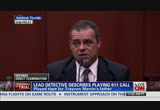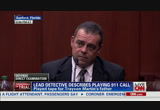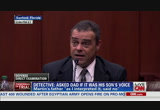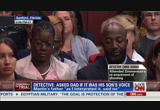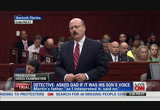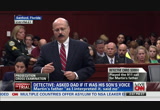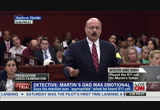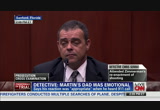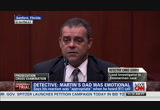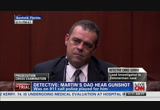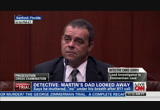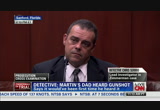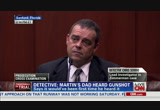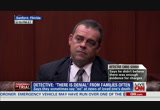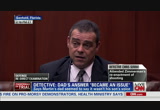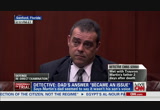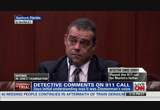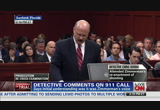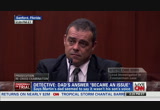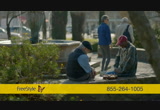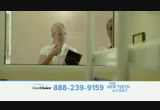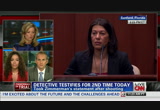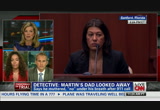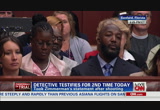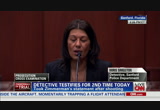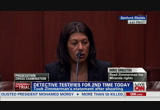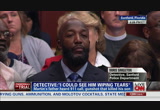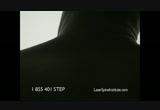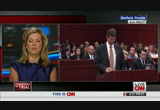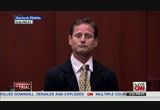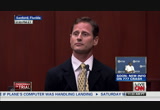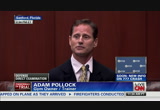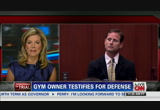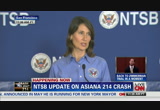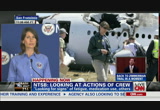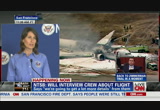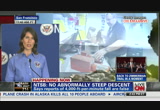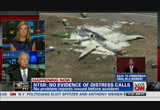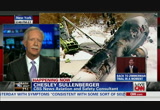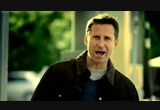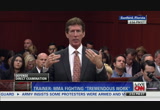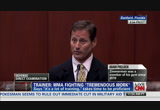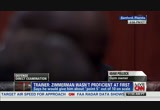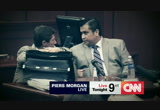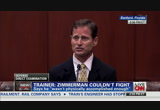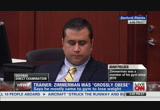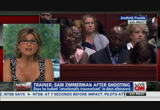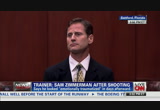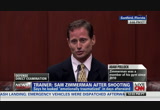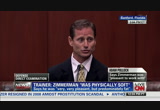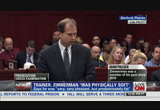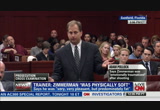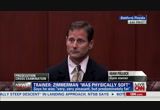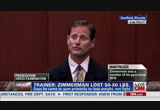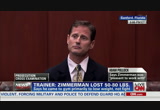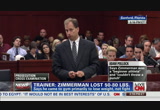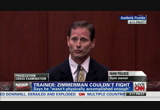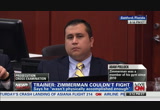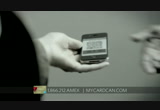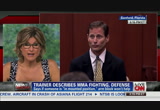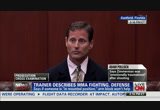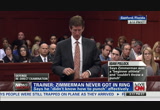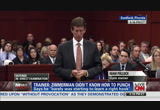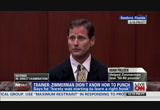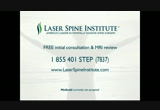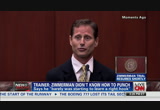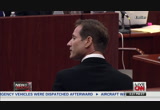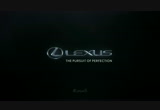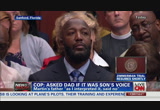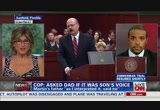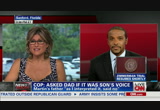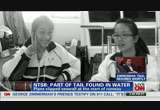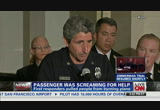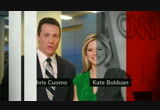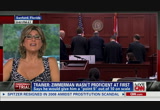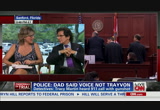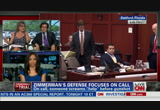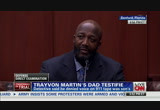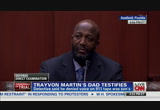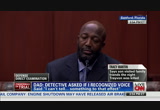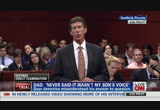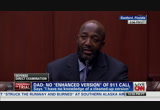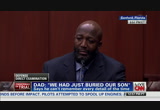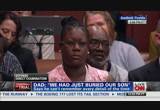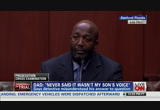tv CNN Newsroom CNN July 8, 2013 11:00am-1:01pm PDT
11:00 am
>> do you recall about how many days after the event of the shooting that was? >> it was either the day after or the day after the -- i think it was the 28th. >> okay. what was the purpose of you bringing mr. martin and miss green to your office? >> to bring them up to speed as far as the progress of the investigation, where we were at that point. >> okay. they had some concerns, did they not, as to whether or not mr. zimmerman at that point had been arrested? >> yes, sir. >> were you sharing with them your progress, what was done and what still needed to be done? >> yes, sir. >> and can you outline the setting, where you were when you had this conversation with the two of them? >> we conducted a meeting in the conference room that we have in the police department on the second floor. and after that i went ahead and played the 911 recordings for him. >> do you recall where that recording took place? >> it was at my desk.
11:01 am
>> and that was, as testified to by a previous officer, sort of a cubby hole setup with two or three other desks in close proximity? >> yes, sir. >> and can you then tell the jury how that was set up, where you were sitting, where mr. martin was sitting, if he was, and where miss green was sitting? >> okay, i was seated in front of my desk facing my computer monitor. mr. martin was to my rear left. and next to him was his girlfriend or fiancee, brandy. and kind of like in that posture. >> okay. so if i'm sitting at my screen right here, you were sitting down? >> yes, sir. >> tracy martin, then, was just over your left shoulder? >> yes, sir. >> and then brandy green just behind or next to him? >> yes, sir. >> and what was the focus at that point? >> the audio portions of the recording that was played on my computer. >> we know -- and i want to
11:02 am
focus you on what we have shorthand called the lauer 911 call. do you understand what i mean by that? >> yes, sir. >> and that is the call that has the screams on it and the gunshot? >> yes, sir. >> did you play that for mr. martin and miss green? >> yes, sir. i played all the recordings for him. >> okay. focusing on the 911 call we just talked about, the lauer 911 call, tell me how you played that, what volume or how the setting of that occurred. >> i can't recall the number as far as the volume went, but it was audible, relatively clear, as clear as i had. it was played off of a -- i believe off of a cd. it might have been digital, e-mail. i don't quite remember. but it was played. and it was audible. >> okay. and what was mr. martin's response? >> emotional.
11:03 am
understandab understandable. and i let him listen first. >> i'm sorry? >> i let him listen first before i asked anything. >> okay. and what did you ask him? >> i believe my words were, "is that your son's voice in the background" -- i think i said it a little differently than that, but i inquired if that was, in fact, his son calling for help. >> and what was his response? >> he -- it was more of a verbal and nonverbal. he looked away, and under his breath, as i interpreted, said no. >> did he ever ask that the tape be played again for him at that time? >> i don't believe so. >> did he ever evidence to you any concern with being able to hear the tape? >> no, sir. >> had that occurred, would you have simply played the tape for him a second time? >> absolutely, sir.
11:04 am
>> and miss green, what was her response? >> she was consoling him. >> did you ask her specifically whether or not she believed it to be trayvon martin's voice? >> no, sir, i did not. >> did she offer any opinion voluntarily as to whether or not she believed it was trayvon martin's voice? >> not that i recall, no, sir. >> do you know who else was present in the area sort of nearby within, let's say, earshot of the playing of the call? >> one of our sergeants was behind us. he was walking through. i guess he saw what i was doing. and he took it upon himself to stop. and i believe that was the only person that i saw. >> do you recall what that sergeant's name was? >> sergeant leon seesla. >> nothing further, your honor. >> cross?
11:05 am
>> good afternoon, sir. >> good afternoon, sir. >> let's talk about the last thing you mentioned. sergeant seesler was walking by and you believe stopped, is that correct? >> no, he stopped, yes. >> and detective or investigator singleton wasn't around, as best you can recall, is that correct? >> no, sir. >> she was not, correct in. >> no. i didn't see her there. >> okay. now, i assume by the nature of your profession that this is one of the most difficult things you have to do? >> by far, sir. yes, it is. >> to have to talk about the death of a loved one to a parent. >> yes, sir, it was. >> is there anything more difficult that you have to deal with as an investigator and in a case involving the death of a person? >> other than initial notification, probably not. >> and i gather you tried to, as best you can, to be as sensitive as you can, realizing how sensitive this issue is or how
11:06 am
traumatic an event it can be, correct? >> yes, sir. >> and that you attempt to do that as best you could? >> yes, sir, i did. >> i gather you informed trayvon martin's dad that you were going to have him listen to some recordings? >> yes, sir. >> did you tell him ahead of time that there would actually be a shot? in other words, that he would actually listen to the death of his son, in other words? did you tell him ahead of time? >> i don't recall specifically informing him of that, no. >> okay. but you played -- i think you said five or six 911 calls, is that correct? >> everyone that i had, yes, sir. >> okay. and at this time do you recall the order or how you played them other than you played them all? >> i don't recall the order, but yes, sir, i played them all. >> and would you agree that some of those recordings such as
11:07 am
gut-wrenching, in other words, for a parent to have to listen to when they're talking about the death of their son? >> yes, sir. >> okay. they were pretty emotional? >> yes, sir. >> and would you agree that mr. martin's reaction was appropriate in the sense of having to relive that, even though he wasn't there, but having to, again, understand that his son was no longer among us? in other words, that his son was dead, in heaven, hopefully? >> yes, sir. >> and would you agree that he reacted appropriately to that? >> yes, sir. >> so you played the recording in which mr. diak -- and the jury's listened to them, so i'm not going to play them again -- but she's describing the death of this kid, or describing whatever she heard, is that correct? >> yes, sir. >> and you played other recordings in which other people were describing what they saw, correct? >> yes, sir. >> okay. and i gather, as you're playing this, mr. martin's getting very emotional, would that be fair? >> yes, sir.
11:08 am
>> was he having a hard time dealing with this? >> in my opinion, yes, sir. >> okay. and i gather he didn't say hey, hold on. you know, this is too difficult for me. let me come back another day. he went ahead and said, i'm going to listen to everything? because he wanted to know what was going on in the case. would that be fair? >> yes, sir. >> and from your perspective, that was very understandable, correct? >> absolutely, yes, sir. >> i mean, his son has been killed. what, two days earlier. correct? >> yes, sir. >> and he's wanting some answers, as any parent should want. wouldn't you agree with that? >> yes, sir. >> wasn't that reasonable on his part? >> yes, sir, it was. >> that next thing he knows, he gets home, and his son is missing, and then he realizes, his son's dead. >> yes, sir. >> and it's not just from natural causes. somebody has shot him in the chest. >> let me object, your honor, outside the scope of direct examination. >> your honor, i think this is pertinent to the issue that i'm trying to establish, the
11:09 am
scenario -- >> well, then get to your next question, please. >> yes. in other words, did you preface any of this -- i know this is going to be very difficult for you, but please try to listen to all these recordings? i'm assuming you did that because you're a police officer that's been around the block a lot of times. >> i believe i did, yes, sir. >> okay. and he -- even though realized he was going to be emotional, said i'll try to listen to this and try to go through it? >> yes, sir, he did. >> okay. and as he's listening through this, is his emotion kind of building up? do you see that building up? >> it was a very emotional moment, yes, sir. >> and then you play at some point the recording of the screams for help, correct? >> yes, sir, i did. yes. >> but also in that recording, there's actually a gunshot, correct? >> yes, there is. >> okay. and i gather you played, as a good investigator, you played all the recordings from beginning to end, correct? >> yes, sir. >> so that there would be no issue about what was going on, that you actually were thorough
11:10 am
in your attempting to tell mr. martin what had happened. >> my objective was to share all the information i had with them. >> so you were providing all those recordings? >> yes, sir. >> okay. and i gather he's listening to these cries, and then he hears the gunshot, correct? >> yes, sir. >> and then you keep playing it, right? >> yes, sir. >> and i guess it was obvious in the way you were playing it that we were talking about his son having been shot. >> correct. >> i mean, was there any dispute about that? >> no, sir, there was not. >> that he understood that that was the death of his son? >> yes, sir. >> and i gather you being as sensitive as you can, based on these circumstances -- i'm assuming it was emotional for you, too. >> it was trying for me, yes, it was. >> okay. >> mm-hmm. >> and obviously being a good investigative police officer, having done this for a long time, you were trying to be as sensitive as you could in
11:11 am
dealing with the death of a young boy that the father was there, in other words? >> yes, sir. >> okay. and then at some point you had to ask him some questions about the identification of the voice, correct? >> yes, sir. >> and you, as best as you could, even though you knew mr. martin was upset and emotional, you still felt you had a need to ask him at that point, correct? >> yes, sir. >> and i think you asked him something to the effect, do you recognize the voice? do i have it right, or am i misstating what you said? >> it was either do you recognize the voice or is that your son's voice in the background? >> okay. and as this was going on, when you specifically asked him that, i think you described mr. martin, his head was down, correct? >> it was more like looking away from me and the computer. >> like he didn't even want to deal with it? >> yes, sir. >> is that how you interpreted it? >> yes, sir. >> and then you stated that it
11:12 am
was under his breath. i gather -- did i get that right? >> yes, sir. >> and you interpreted it as he said no, correct? >> yes, sir. >> i mean, you didn't flat out hear the word "no" unequivocally, or did you hear it like something under his breath and he was distraught? >> i heard it and saw the movement of his mouth. >> okay. so you believe -- your opinion is that he said no? >> yes, sir. >> now, do you know if that no was directed to the fact that you had just played literally not a videotape of his son's death, but an audiotape, or was it related to the identification of the voice, do you know? >> let me object, your honor. that would be speculation of this witness. >> sustained. >> would you agree that when you asked him that, that was after you had played the recording which you were asking him to identify the voice, but in that same recording, he was hearing, for the first time, right, the
11:13 am
death of his son? >> yes, sir. >> right? >> yes. >> as far as you know, he had never heard this shooting before in terms of his son being killed. >> yes. this was probably before it was released, so it had to have been the first time. >> okay. if i may have a moment, your honor. >> yes, you may. >> and sir, i gather in all your years of doing this, when people are hearing about the death of a loved one -- even when you go, like, to the door when you go to their house, most people, they react like oh, no, my god's something's happened. their son or loved one is no longer among them.
11:14 am
is that a normal thing that people -- or do people just react, oh, okay, no big deal? >> it's extreme grief. so yes, that is typical. >> and the word "no" is like i can't believe it, like he's dead. isn't that a normal thing? >> that would be speculation. >> it's based upon what his experience has been. so in that regard, i'll allow it. >> right? it's normal for when you're telling them about the death of a loved one, people say no, you know, like i can't believe it, that kind of stuff? >> it could be construed as denial. yes, sir. >> right? and that would be a normal thing based on your experience when people say no, right? >> yes, sir. >> thank you, sir. no further questions. >> any redirect? >> when you talked about during all of the 911 calls, you played all of those 911 calls, correct? >> yes, sir. >> but it was only after and specifically after you played the lauer 911 call that you looked at mr. martin and asked if that was the voice of his son
11:15 am
screaming in the background, correct? >> it was the most graphic, yes, sir. >> all right. and it was right at that precise time because you wanted to know what he thought of the voice on that tape, didn't you? >> objection, leading question. >> what was the purpose of asking him? >> to clarify that it was, in fact -- if it was or if it wasn't his son's voice. >> right. because that was significant to your investigation, correct? >> yes, sir. >> you were doing it as sensitively as you could, but it was something you had to do as the chief investigator. >> yes, sir. >> because you knew that if trayvon martin's father had said -- >> objection, leading question. >> okay. you need to rephrase your question. >> was it significant in your investigation that mr. martin said it was not the voice of his son? >> it became significant in the investigation because at that point in time there really wasn't much of a dispute at that time of where that voice came
11:16 am
from. >> because it was your understanding in your investigation that other -- let me ask you this. what other information supported that that was george zimmerman screaming? >> objection as to hearsay now. >> only to the extent that he was the chief investigating officer, your honor. >> just speaking objections, please. >> sorry. >> overruled. >> it was statements that i obtained from the initial responding officers. coupled with statements provided by an eyewitness. you want names or -- >> sure. >> okay. officer tim smith. a statement that he had heard the defendant make. and john goode who at that point had brought me both a statement both in writing and i believe taped also that it was his belief that it was george zimmerman the one yelling for help. >> so with that information in
11:17 am
mind, you were presenting this to mr. martin with what idea? what did you want to accomplish by presenting this to mr. martin and having him listen to it? >> for my own clarification to make sure that everybody had it correct. or at that point. information that i had was correct. >> and did that information -- did mr. martin's response fit into the other information you already had available? >> at that point in time, yes, sir. >> and to the extent that he said no, you understood that to be what? when he said no, what question do you think he was answering? >> that the voice in the background was not that of his son's. >> did he ever contact you in the days or weeks after that to ask you whether or not he could listen to the tape again? >> no, sir, he did not. >> did he ever say anything to you about, i want to change my mind, and i want to listen to it again to see, anything else about that tape? >> no, sir. >> did you question directly ms.
11:18 am
green in regard to her thought as to whose voice that was? >> not that i recall, sir, no. >> did she counter or contest tracy martin's acknowledgment that it was not his son's voice? >> objection. calls for hearsay and also an assumption on the part of ms. green. >> i'll rephrase it. >> the objection is sustained. >> did ms. green counter -- did she say anything that evidenced to you as the investigator that she disagreed with mr. martin? >> no, sir. >> know it was undoubtedly a very emotional time for mr. martin and also for you, do you have any concern that he understood your question and that he answered it by saying no? >> no, sir. >> thank you. nothing further, your honor. >> thank you.
11:19 am
>> you were asked about information you had prior to that. >> yes, sir. >> and you mentioned mr. goode, correct? you mentioned mr. goode and the defendant, mr. zimmerman, correct? >> i didn't mention mr. zimmerman. that was an opinion of mr. zimmerman. >> okay. you mentioned tim smith. >> yes, sir. >> that he had actually heard the call, or he just said this is what mr. zimmerman said? >> yes. >> okay. right? >> yes, based on what mr. zimmerman said to officer smith. >> right. and you recall when you played that recording to mr. zimmerman, that mr. zimmerman said, it doesn't sound like me. you recall that? >> yes, i do. >> in terms of you played that 911 call, and he told you, it doesn't sound like me, correct? >> i believe his words were, that doesn't even sound like me. >> thank you. thank you, sir. and finally, sir, you were asked about ms. green you knew as the fiancee or girlfriend of mr. martin, right? >> yes, sir. >> and would you agree that she was consoling mr. martin, correct? >> yes, sir.
11:20 am
>> so in terms of what she said, she heard or not, she was focusing on providing whatever comfort she could. >> yes, sir. >> to the father of the death -- the father of trayvon martin? >> yes, sir. >> would that be accurate? >> yes, sir. >> okay. now, i gather in all your experience, you've never had a recording such as this where you don't just have a voice, but you also have the shooting itself all in one recording, or have you had that before? >> no, this is the first. >> that's the first time? >> yes, sir. >> so it was pretty emotionally draining for you, too, i'm assuming having to play that for the victim's dad? >> that and the circumstances surrounding the entire incident. yes, sir. >> we are watching key -- a key witness here, the lead investigator in the case, detective chris serino, talking about really the heart of this issue. whose voice was on that tape and
11:21 am
11:23 am
...and we inspected his brakes for free. -free is good. -free is very good. [ male announcer ] now get 50% off brake pads and shoes at meineke. so you are watching the george zimmerman trial. and as we watch officer doris singleton get on the stand here, we want to get some input from our panel on the witness that we just saw, his second time on the stand, detective chris serino, the lead investigator in this. with us now, we have michael greco who is a criminal defense lawyer, and cnn legal analyst sunny hostin. guys, this is pretty fascinateding because what you've seen here in the last few days is loved ones in the camp
11:24 am
of trayvon martin or george zimmerman, and they have all said the same thing, which was, it was my loved one whose voice that i hear on the tape. this is very important, this 911 tape, who was screaming before the gunshot because is t really goes to the heart of the question in the case, who was the aggressor? what we've seen here from mark o'mara, the questions he has thrown at detective serino here, we're seeing the detective say that he spoke with tracy martin, trayvon martin's father, and the first time he heard the 911 tape, when asked if it was his son's voice, he said no. how damaging do you think this may be, michael, or was -- do you think the prosecutor here was able to kind of, i guess, fix some of the damage? >> no, i think it's very damaging. i think that by bringing somebody in and bringing -- being able to bring out the testimony of the father without actually having to put the father on the stand and show to
11:25 am
the jury that before anybody knew there was going to be a trial, before this had gotten any media attention, the father said that's not my son's voice. that's a very big deal. that brings us all the way back to the first couple of weeks of this investigation. and i do not think the prosecution did any -- i don't think they were able to cancel out any of the damage that the defense was able to do. >> and sunny, we'll get right to you in a moment, but let's first listen to what officer singleton is saying on the stand. >> cross? >> good afternoon again, officer singleton. you recall actually tracy martin saying that was not his voice, that is not his son's voice? >> yes. >> okay. and you clearly heard him say those words? >> i don't know his exact words, but he was telling us that it was not his -- he was telling chris that it was not his son's voice that was screaming for help. >> he said words, in other words, like you're saying? >> yes. >> okay. and then after that he put his
11:26 am
head down is what you're saying? >> i think it was even while listening to it. >> okay. >> that he was already crying. because you could hear the gunshot. >> so obviously you were sensitive of that, too, the fact that they were playing this recording to the father of the person that's being shot on the tape, correct? >> yes. i was choked up myself. i had to stand back. and i felt -- you know, i could feel how he must feel because i have children. and i was choked up by it. i felt horrible for him. >> you could see that and sense that in mr. martin? >> yes. >> okay. now, you were were you there fo playing of all the recordings or just part of it? >> i don't know if there were more recordings. that stuck out in my mind because i remember feeling so awful for him, that he would have to hear that. >> so as far as you can recall, the only one recall is the one
11:27 am
where they were playing the recording of the screams but also the shooting -- >> yes. >> -- of mr. martin's son? >> yes. and that's why it stood out in my mind. >> and was stood out in your mind is the pain that that father must have been going through at the time. >> yes. to know that he was hearing the sound that ended his son's life was tough to watch. >> and did he, in your opinion, react as any grieving father would react? >> yes. he was very sad. >> now, he didn't get up and start screaming or anything, correct? he just basically put his head down and just started crying, right? >> he was -- i could see him wiping tears from his eyes. i mean, he didn't -- he didn't lose it. i'm sure he was trying to hold himself together. he's in the middle of the police department. but you could see that he was -- he was upset, of course.
11:28 am
>> and as you indicated, even while you were doing it, even from a distance away, it was hard for you to listen to that, correct? >> yes. and i had already heard it. >> and i think you've already stated you felt awful for him, correct? >> i can't imagine having to go through that because i have children. i couldn't imagine. >> thank you, ma'am. >> any redirect? >> briefly. as sad as it was, both you and obviously for mr. martin to go through, is there any doubt in your mind that he had said that that was not his son's voice that he heard screaming? >> no, there's no doubt that he was telling us that that didn't sound like his son. >> nothing further. >> may officer singleton be excused? >> yes, your honor.
11:29 am
>> you're excused subject to being re-called. today? they'll call you. thank you. call your next witness, please. >> the defense would call adam pollock. >> you are watching the george zimmerman trial. we're going to take a quick break as we await the next defense witness to be called. we'll be right back.
11:31 am
11:32 am
athlete, tell us a bit more about what that means. >> i started off as a child playing a variety of competitive sports, including soccer, basketball, racquetball. i actually toured for a while as a pro am racquetball, fighting for boxing and muay thai. >> tell me -- let's focus, then, on the experience you've had in fighting and tell me about that. >> i've been involved in fight training for the majority of my life. i started competing regularly after about 18. i did that for quite a few years. >> what type of competing are you speaking of? >> for muay thai work. >> and explain, if you would to the jury, what that is for those of us who don't know. >> it's very much like boxing, but it's another ring sport like boxing, but with muay thai, you're allowed to punch, kick, knee, elbow, clinch. you can hold and hit.
11:33 am
>> is that, i guess, closer to what we might call kickboxing? >> yes. >> and you competed in that? >> correct. >> for how many years? >> i don't know exactly. quite a few. >> okay. >> during that time, what else -- what other training did you do? how else did you involve yourself in this industry? >> i've been around weight training my whole life. my brother's a former mr. usa and a nationally ranked bodybuilder and power lifter. so i just grew up in the gym. i have a fairly extensive background, you know, as far as the weight training and i also have a background with competitive kettlebell lifting. >> have you ever assisted in other activities around the ring or for other fighters who are in the ring? >> absolutely. >> what would that include? >> corners for both amateur and professional fighters for all different levels of competition.
11:34 am
>> what does working the corner mean? >> when you take the fighter to compete, somebody has to take care of the athlete. so when they come back to the coroner between rounds, we're actually preparing them to go out to compete. and then when they come back to the corner between rounds, you have to make sure and give them water and any type of cuts, bruising, icing, et cetera, you have to address accordingly in a very short period of time and then send them back out to do the next round. >> if i asked you to guesstimate how many times you were a cornerman -- >> too many to count. >> okay. and this is, again, during the same time that you have been involved in this industry both during muay thai training and competing and other fighting? >> oh, yeah. yeah, this has been consistent over the last 20-plus years. >> if i were to say the term mma to you, what would you interpret that to mean? >> mixed martial arts, which is a competitive fighting sport.
11:35 am
it has gotten extremely popular recently. >> and that the stuff that we see if we watch such things on tv where you see almost sort a mix of kickboxing, regular boxing and whatever else you can do? >> yes. in mixed martial arts, it's basically you can do, you know, almost an amalgamation of boxing, kickboxing, wrestling, jujitsu, submission grappling to where, you know, you can punch, kick, et cetera, and then when you get onto the ground, you can work submission holds, chokes, arm locks, leg locks, things of that nature. >> and so within the context of mma, there are a lot of different disciplines -- or are there many -- >> let's take a break just for a moment from the zimmerman trial and go to the briefing by the ntsb on the very latest in that asiana airlines 777 crash. you may know that san francisco fire authorities say one of their units may have actually
11:36 am
impacted or come into contact with one of the crash victims amid reports that one of the victims -- one of the two who were killed may have actually been hit by one of the vehicles. let's listen to the chair wowom of the ntsb. >> -- accident investigation board. they are our counterparts from korea. and they are supported by their technical advisers, asiana airlines. the ntsb employs a party system to help us in our investigations. we rely on our parties to provide us information to assist us, and particularly to provide technical expertise. so, for example, with the manufacturer of the aircraft, boeing, that would be about the design and the function and the performance of the aircraft, pratt & whitney, it would be the engines. we have a number of activities
11:37 am
that we're undertaking. i'm going to talk to you about our ops, operations, and our human performance team. they have documented the cockpit, the switch positions and locations. they also have located the pilot flight bags and the charts that they used for flight. they found the appropriate charts for the airport and the approach in place in the cockpit. they are now reviewing manuals and training. they're working to conduct 72-hour work/rest histories. and those 72-hour histories are really looking at the pilot's flight and duty time, their rest opportunities, and the activities that have taken place in the days leading up to the crash. in our investigations, we're often looking for things that might affect human performance
11:38 am
like fatigue, like illnesses or medication, like health issues. and so we will be looking at all of those things to see if there are any impacts on their ability to perform their jobs. we are working to interview all four pilots that were on the aircraft coming into san francisco. there were two pilots, and many of you all have talked about those two pilots. it was a captain who was working on his initial operating experience on the 777. he was an experienced pilot and a prior captain, but he was working on getting his rating on the 777 and getting initial operating experience on the 777. he was also flying with a check captain or a training captain. and then there were two other crew members, another captain
11:39 am
and first officer who were also flying. again, remember, this is a very long transpacific flight. and so the four crew members are there for relief so that the others can get rest. when we interview those four crew members, we are going to get a lot more details about their activities, about their work, about their training, about who was the pilot flying, who was the pilot in command in the cockpit at the time of the accident. we're going to be looking to correlate all of that information with what we are finding on the cockpit voice recorder and flight data recorder. it was important for us to wait until the arrival of our korean counterparts at the k-rab and also asiana, when we conduct interviews, we utilize the party process. we do group interviews, and we've got pilots who also might need translation services during
11:40 am
those interviews. we want to make sure that those interviews are effective and that they're comprehensive. i know you all have a lot of questions about the pilots and their training. i will tell you that when we brief tomorrow, i hope to have a lot more information about the pilots just to head off some of those questions that i may not be able to answer today until those interviews are complete. our atc team has looked back through communications, through voice communications, and as i shared with you yesterday, we have no evidence of any distress calls or any problem reports with respect to the aircraft prior to the accident. we will be reviewing data for prior flights coming into san francisco in the hours and the
11:41 am
days prior to the accident. particularly on the accident runway to see if there were any issues associated with the recent runway construction or the glide slope outage. this crew was vectored in for a 17-mile, straight-in, final visual approach. they were vectored in from the northern california trey con which is located near sacramento. asiana 214 reported that they had the airport in sight. they were cleared for the visual approach. and they transitioned to tower control. they were cleared to land by the tower. and then there was the accident sequence and the subsequent launch of the emergency
11:42 am
responders on the airport property. some of that we've already talked about yesterday. i have seen and heard some reports about a 4,000-per-minute -- 4,000-foot-per-minute descent rate. they have reviewed the radar data. and the group that reviewed the initial faa radar data have indicated that there's no abnormally steep descent curve that's been detected in the data that they have. our power plants team has conducted an on-scene examination of the two engines. they indicate those preliminary evaluations indicate that both of the engines were producing power at the time of impact. and this is consistent with
11:43 am
information that we also see on the flight data recorder. there was no evidence of an uncontainment. the number two engine was found adjacent to the fuselage, and there's evidence of high rotation at impact. the number one engine was found liberated from the aircraft. and exhibits severe rotational damage. we also took fuel samples from the aircraft for testing. the flight data recorder and cockpit voice recorder groups are beginning to convene in washington. we will create groups who will listen to the flight data recorder and help transcribe. we want to have people on that cockpit voice recorder group who are familiar with the aircraft and any noises or sounds or alerts that might come from that
11:44 am
aircraft. we also want to make sure that we have korean speakers on that group as well. there's a mix of english and korean heard on the cockpit voice recorder. those teams will begin their work, looking at the two-hour cockpit voice recorder and transcribing the sections that they believe are most relevant to our accident investigation. the flight data recorder group will be validating the parameters on the recorder. as i mentioned yesterday, this is a recorder that has data on it, and there are 1,400 different parameters that are measured by the recorder. we want to make sure that we understand those parameters, what they represent, and make sure that the information that's on there, the data on there -- >> you are watching the chairwoman of the ntsb give a press conference there on the
11:45 am
asiana airlines flight that crashed on saturday, the 777 at sfo. let's bring in now for reaction chesley "sully" sullenberger, captain and cbs aviation and safety consultant. he's live with us from new york. chesley, i guess one of my first questions here -- and we're sort of getting a sense of this now that we know from the ntsb -- this pilot was not the main pilot. he obviously had thousands of hours of experience on commercial aircraft. but this was the first time that he brought a 777 into sfo. and i'm wondering from your perspective, should he have been allowed to be in this position, having so few hours, and also being in an airport he was unfamiliar with and certainly an airport that provides some challenges with such a big aircraft? >> well, that's -- certainly that's something that's going to be looked at. let me take a moment from personal experience, one of the
11:46 am
things i enjoyed the most at the airline a period when i was a supervisory captain and instructor. we were hiring new pilot, and i got to fly with pilots who had gone through the classroom training. they had several thousands of flight experience before they came to the airline. and i got to fly with them on passenger flights and sign them off as being completely qualified to fly with regular line captains. i also got to fly with captains who were new who had been first officers who had been through all the training to become a captain. i would be flying in the right seat supervising them as they took on new captain duties. it's a very controlled environment. people are professional and have well-defined roles and responsibilities. and we take those very seriously. so that in itself isn't really an issue if it's done well. everyone at some point is new to an airplane. even if you have 10,000 hours, there still is that time when you're new to a particular type of airplane. and at least in this country,
11:47 am
there are restrictions we put on them about how low visibility can be, what kind of airports you can go to when you haven't gotten as much experience in that particular type of airplane yet. in fact, four years ago on the hudson river flight, my first officer, jeff skiles, was brand new to the airbus. he had 20,000 hours, but he just finished his initial training. so it happens as a matter of course every day at every airline. and that itself is not inhere inherently an issue. of course, they'll be looking closely at all the human factors. was there fatigue? was the training good enough? how well did this particular crew work together on that flight? the fact that he was checking out as a new captain on the 777 isn't in and of itself a real problem necessarily. >> and then sully, one of the other things is that there doesn't appear to have been if you're a passenger on this flight, there was no indication that something was going wrong until it was very much going wrong. you famously said to the
11:48 am
passengers on the flight that landed on the hudson after striking geese, you got on and said, this is the captain. brace for impact. you gave them a heads up. looking -- i know we look at sort of the time here, that it was a second and a half prior to impact that they were thinking they could do a go 'round which obviously wasn't going to happen, but should someone have gotten on and been communicating with folks who were on the plane? do you think that that was necessary and certainly could have prepared them more? >> there likely wasn't time in this particular case. what we will be looking at -- what investigators will be looking at also -- again, among all the human factors that may have led to this, all of the how, the what and t why that went on in this flight is how did they get to that point before action was taken to begin to rectify it? so that really is going to be part of the human factors analysis is how did they get to this point so late in the flight where recovery apparently was not possible? we have, in all our procedures
11:49 am
of all the major airlines, certain checks and balances to monitor and help and assist each other in the flying of the airplane. the pilot flying has certain responsibilities. the pilot monitoring has certain responsibilities. and we have certain protocols that we follow. at a certain point prior to landing at a certain altitude, a certain distance from the runway, we must be stabilized with the wings level at the proper descent rate, the proper speed, the proper altitude all the way from that point to the runway. if we're not, we're required to go around. so we need to find out why they didn't. >> sully, speaking of that, we have some cnn exclusive video of the moment the plane makes impact. when you talk about being in exactly the right position, the wings level, and certainly in this case the nose, can you react to this as you see what's happening? >> it's very difficult to tell. i think it certainly looks abnormal. it looks as though the airplane is at a very high angle of attack.
11:50 am
too close to the ground. and ultimately obviously it's unrecoverable. we will know much more from the detailed analysis of the digital flight data recorder from the information on the cockpit voice recorder, from the pilot interviews. the investigators have huge advantages in this accident investigation that the pilot survived and can't be interviewed and helped to understand what happened and why. the flight recorder, the data -- the cockpit voice recorder have been recovered and begun to be analyzed. all the wreckage is itself on an airport easily accessible. it's not at the bottom of the south atlantic where it was with france 447. they will find all the answers but it's going to take many months. the final report may require a year, year and a half to be written. >> captain sully sullenberger, th thank you very much for your perspective. we appreciate it. we're going to go back to the zimmerman trial. they did just go over mma fighting moves in the courtroom. we'll tell you exact reply why that was. we'll have more ahead.
11:51 am
i have low testosterone. there, i said it. see, i knew testosterone could affect sex drive, but not energy or even my mood. that's when i talked with my doctor. he gave me some blood tests... showed it was low t. that's it. it was a number. [ male announcer ] today, men with low t have androgel 1.62% testosterone gel.
11:52 am
the #1 prescribed topical testosterone replacement therapy increases testosterone when used daily. women and children should avoid contact with application sites. discontinue androgel and call your doctor if you see unexpected signs of early puberty in a child, or signs in a woman, which may include changes in body hair or a large increase in acne, possibly due to accidental exposure. men with breast cancer or who have or might have prostate cancer, and women who are or may become pregnant or are breast-feeding, should not use androgel. serious side effects include worsening of an enlarged prostate, possible increased risk of prostate cancer, lower sperm count, swelling of ankles, feet, or body, enlarged or painful breasts, problems breathing during sleep, and blood clots in the legs. tell your doctor about your medical conditions and medications, especially insulin, corticosteroids, or medicines to decrease blood clotting. in a clinical study, over 80% of treated men had their t levels restored to normal. talk to your doctor about all your symptoms. get the blood tests. change your number. turn it up. androgel 1.62%.
11:53 am
this is a gym owner who trained george zimmerman in mixed martial arts in the weeks leading up to the death of trayvon martin. he actually showcased some of the moves that he showed zimmerman on the defense attorney. he's a witness for the defense. we'll show you that in a second. but first let's listen in. >> -- where would mr. zimmerman fit? >> like i said, about a one. >> generally in his overall athleticism as well? >> well, as far as what i'm looking at in the gym, yes. >> this talk about his proficiency in the boxing that he took, first of all, tell us what it is, what you do when you start out and what do you progress to as you learn more about boxing? >> the way we first start in my facility is we start simply getting proficient within your own body. so if you don't have control of
11:54 am
your body, it's going to make sure -- it's not going to really facilitate other things working as well. so if i started somebody in the boxing ring sparring right off the bat before they know how to punch or defend or move, that's going to produce a pretty unpleasant result. you know, so instead of creating that type of situation where it's a liability and people are just getting damaged, we'll start off learning how to control their body. calisthenics, footwork, ab work, just learning structural integrity and aligning their frame. >> okay. >> in the beginning. >> and tell me, then, how mr. zimmerman came to you in the beginning, again, on a sort of scale of one to ten, as far as his boxing proficiency. >> like 0.5. >> okay. and what did he do, then, along the way to progress? >> he basically just took the normal classes that we offered. and he was diligent about training and working hard. i mean, he was a hard worker. but even a hard worker without having some of that background
11:55 am
is still going to take a certain amount of time of development. i've had guys that start off with tremendous levels of athleticism, and they can get themselves to a fighting level generally within about a year, sometimes two. to actually be a skilled competitor. you know, because i don't throw people in the ring. you know, there are some gyms that they'll throw somebody in the ring. they've been there a couple weeks. they'll throw them in the ring. if they get hurt, too bad. i don't do that. if somebody's not skilled, they don't get in the ring. that's all there is to it. >> did mr. zimmerman ever get in the ring? >> no. >> why not? >> because he wasn't skilled enough for that. mr. zimmerman, you know, worked diligently at learning how to control his body better than what he had. you know, the steps that we'll start off with after all the calisthenics, then we'll put the person on the heavy bag where they'll start to learn how to throw a punch.
11:56 am
and once they get proficient with that, then we'll pair them up with a partner where somebody would throw a punch at them and they learn how to defend the punch, catching, pairing, redirecting, stopping, et cetera. and then once they got proficient with that, then we'll start learning how to move with slipping and weaving and moving and shuffling and putting more movement to it. >> at what point did george zimmerman -- >> we'll have more from the george zimmerman trial in just a moment. humans. even when we cross our "ts" and dot our "i's", we still run into problems. that's why liberty mutual insurance offers accident forgiveness with our auto policies. if you qualify, your rates won't go up due to your first accident. because making mistakes is only human, and so are we. we also offer new car replacement, so if you total your new car, we'll give you the money for a new one. call liberty mutual insurance at... and ask us all about our auto features,
11:57 am
like guaranteed repairs, where if you get into an accident and use one of our certified repair shops, the repairs are guaranteed for life. so call... to talk with an insurance expert about everything that comes standard with our base auto policy. and if you switch, you could save up to $423. liberty mutual insurance -- responsibility. what's your policy?
11:59 am
we are listening to adam pollock, the owner of a gym who trained george zimmerman in mixed martial arts moves. some folks have asked why did zimmerman use a gun to defend himself? why would he have to do that if he was trained in mixed martial arts? what we're hearing here from this witness for the defense is he's saying that he didn't even know how to effectively punch. so certainly testifying at this point in favor of the defense. let's listen into some more. >> no, that's what he was working off of. you know. those were the forms of exercise that he was engaging with. he did do a little bit of, you know, weight training on his own because we've got a facility where it's available for that. but that was not a consistent frequent thing. >> and in your corner work, i presume that you've seen people getting injured in fights, correct? >> absolutely.
12:00 pm
>> almost every time? >> no. depending on the skill set of the athlete that's out there. i've had athletes get out there to fight and never even get hit and knock their opponent out. i've had other guys who come back to the corner and their eye is swelled completely shut. >> you had an opportunity to see mr. zimmerman shortly after the altercation with mr. martin, correct? >> yes. >> can you tell the jury when that was? >> i don't know the exact date, but i would say it was within a couple of days after the incident. >> describe, if you would, if you noticed what he looked like. >> he had black eyes. his nose was scraped up. he had some bandages on his head. and that was as far as the obvious, you know, physical bruising that he had. he looked emotionally traumat e traumatiz traumatized. >> have you seen that in fighters that you've worked with? >> i've seen that in people. and generally not in fighters after, you know, after they've been competing for a while.
12:01 pm
a little bit different. he had the look of a human being who had been through an extremely traumatic experience and was traumatized from it. almost like a state of shock that was continuing. >> the -- did he have a conversation with you where he discussed shrimping in regards to this event? >> yes, he did. >> and what was that? >> objection, hearsay. >> please approach. >> hi, everyone, i'm ashleigh banfield coming to you life from sanford, county, at the criminal justice center. we are in live testimony in the second-degree murder trial of george zimmerman. and you can see the parents of trayvon martin. by the way, if you didn't already know this, they are
12:02 pm
divorced, but they have been side by side throughout this trial. and i dare say really for the last year and a half, they have been united in their efforts to get to the bottom of what happened to their 17-year-old unarmed child the night he died back in february of 2012. they were just at sidebar, but they've got the personal trainer, the guy who knows a lot about mixed martial arts on the stand to talk about just how good a student or athlete george zimmerman is/was. let's listen in. >> as far as you had testified regarding his athleticism, what words opinion that context -- how would you define george zimmerman? >> nonathletic. i think probably the best way of describing it, i had happened to have had a meeting with one of my other trainers that i saw, it
12:03 pm
happened to be yesterday. i had a very brief conversation with him. # when i first mentioned what i was going to be coming to testify, you know, he didn't realize that this was the same person that we were referring to -- >> judge, i'm going to object again. >> sustained. >> let me -- >> hold on a second. i was asking you for you to describe mr. zimmerman. and i think you were going to give us a story about maybe how somebody else described him. that's been objected to, sustained, which means you can't tell us what the other person said. >> yeah. >> but if you can tell us in your words. >> he was -- and i really don't like to use this type of terminology. >> we've heard words that we don't want to use. >> soft. just physically soft. he's not a -- you know, he was an overweight, large man when he
12:04 pm
came to us and a very, very pleasant, very nice man, but physically soft. he was predominantly fat. not a lot of muscle. not a lot of strength. >> a moment, your honor? >> soft, fat, not a lot of muscle, not a lot of strength. let's continue to listen as mark o'mara continues this direct exam. >> you mentioned a couple of different ways to end a fight, a tapping out. >> yes, sir. >> does screaming for help work? >> if you're in a competitive situation, you can, you know, you can verbally tap out by saying "i quit," and then the referee will step in and assist. >> nothing further, your honor. >> cross? >> thank you, your honor. good afternoon, sir. >> good afternoon. >> i'm going to let you plug your gym for a minute. would you tell us what your
12:05 pm
slogan is? >> i'm sorry? >> tell me the slogan of your gym, if you would. >> the slogan of our gym is learn without getting hit. >> you ever call it the -- anything about being the most complete fight gym in the world? >> well, sometime -- we've got a rather large facility, and so some time ago, we had set up on our website, because there was really no facilities around that had full weight training facilities and full fight training facilities. so we put it as the most complete fight gym in the world. at that point that was accurate, you know. things have changed. now there's a lot of gyms that have followed suit to what i do. and they've updated their facilities now to have weights and whatnot as well. >> speaking of other gyms, i understand that mr. zimmerman was going to yours for, i, somewhere i think you said between october of 2010 and the end of 2011? that he took a couple months off and then came back? >> basically. >> okay. do you know if at all he might
12:06 pm
have been going anyplace else, whether that was another gym like you mentioned or just working out at home or working out at, for example, some apartment complexes or communities have fitness centers, that sort of thing? any idea whether he was doing any of that? >> not to my knowledge. you know, we've got a very unusually complete facility. and it makes it really easy, and we kind of give a lot of leeway of access to the facility for the members. so he's got access to a place that would be unlike anyplace else that would be available to him. so it wouldn't make a lot of sense for him to be going somewhere else. and he was a very loyal type of individual. so i don't foresee him going to some other facility. >> would you have encouraged him to sort of work out on his own? i mean, as simple as going for a run or lifting weights at home or anything like that? >> generally i encourage my students to come to as many training sessions as possible so they can have supervised
12:07 pm
instruction so that they're not creating bad habits. >> would you tell him not to work out alone? >> i would tell them to come in for more training sessions at our facility. >> the weight that the defendant lost was in the ballpark of 90 pounds or better, right? >> i don't have an exact measurement, but when he first started, he was in -- i want to say between 250 and 260 pounds. and he would have lost, you know, between 50 to 80 pounds. >> and actually, i think you testified before that his body mass index was somewhere between 15 and 20% body fat. >> i don't have the exact amount because i didn't do a body fat analysis on him. but i would think that he probably would have a little bit more body fat than that. >> okay. do you remember talking about somewhere between 16 and 20%? >> i remember hearing and looking at a deposition on that. and i saw the numbers on there. and when i saw the numbers on there, it seemed a little odd to
12:08 pm
me because it seemed a little bit low for him. >> you certainly don't deny that that's what you said, right? >> i'm not arguing whether i said that or not. >> as far as -- i guess let's talk about the first blow advantage type of thing first, right? >> sure. >> the first blow can be a very good advantage in a combat situation. >> correct. >> and you would have taught, i guess, all of your students this fact. >> well, i'm not going to start teaching somebody about strategy if they don't have the basic fundamentals. >> would they have absorbed this or seen this or heard it talked about? any chance of that? >> is there a chance of that? sure. you can turn on the tv and figure some things out. but that's not something that i'm going to teach a beginning as far as strategy goes if they don't have the basis of fund meant fundament fundamentals. >> it's not a big advantage. >> it's not going to do anything if you don't do anything with
12:09 pm
it. >> it's an advantage. >> potentially. >> leaves you open for a quick counterattack. >> potentially. >> as far as grappling itself goes, you said that that was actually what you started the defendant in, right? >> correct. >> and i think you characterized it as sometimes when you're rolling around on the ground, a lot of things can happen to you. >> correct. >> scuffed up, marked, scraped, sometimes even cut? >> depending on what you're rolling around on, absolutely. >> okay. and you talked about some techniques, bridging and shrimping and that sort of thing. those are designed actually to move you from an unfavorable position to a less unfavorable position. >> correct. >> and they're designed to effect that change of position as quickly as you can do it. >> correct. >> because when you're grappling, that's a fairly exhausting situation. >> exactly. >> and is that why they played
12:10 pm
in some -- we could call them short rounds, but obviously you've been a professional. you know that sometimes even a three-minute round can seem like forever. >> a one-minute round can seem like an eternity if you're not in condition for it. >> right. >> and so the goal of some of those techniques that were taught, the shrimping, the bridging, that sort of thing, is actually to take yourself from being, as you put it, in perhaps if someone had you in a mounted situation, to be able to reverse that or at least get out of where you are. >> you get into a not quite as bad situation for short order. >> you said you also taught submission, arm locks and that sorts of thing. >> correct. >> those are also designed to be applied in a grappling scenario even perhaps if you're not able to do much of anything else. in other words, when you can't strike, sometimes you can use a different type of hold. >> i'm not sure i understand what you're going at with this. >> okay. you mentioned that a person on the bottom sometimes, it's going to be hard to strike upward. >> correct.
12:11 pm
>> could you grab ahold of, for example, an arm and apply one of the grappling holds in lieu of actually being able to punch? >> potentially, yes, depending on the position you're in. if you're in a mounted position, grabbing someone's arm to attempt to submit them from simply grabbing their arm is not a particularly practical thing. it's not going to work. >> it wouldn't work well, but that would be a grappling maneuver, the arm lock. >> well, the arm lock is not going to be applied if you're on your back being mounted, you can't arm lock somebody from that position. >> so it wouldn't be even possible to do. >> you have to be extremely skilled, and you have to have dpaish there's a couple of obscure angles that that could be implemented from, but you have to be extremely skilled. >> would you say someone like the defendant had the skill to be able to do that? >> absolutely not. no way. no way. >> and if he said he did it, you wouldn't believe him? >> no, absolutely not. as far as submitting somebody
12:12 pm
with an armbar while he's being mounted, no. >> okay. let's talk about striking for a little while, if we could. >> sure. >> i know in muay thai, you get into the kicking and knees and the elbows. punching, you would teach a number of different strikes, right? the jab, the cross, the hook? >> uppercuts. >> all of those? >> yep. >> and you said you had him working with a heavy bag. would you ever do the sparring mitts with someone? >> if they don't know how to control their body to throw a punch properly without hurting their wrists or elbows on a heavy bag and shadow boxing, putting them on focus mitts -- i'm not going to do that. >> is that a no, you never put him on mitts? >> no. >> what weight were his gloves? >> he had bag gloves which are going to be light. as opposed to a 16-ounce boxing glove or sparring glove. generally an old-school bag glove is probably four to six ounces. >> okay. and he would be -- you'd have him wrist wrapped and everything like that? >> correct. so to help avoid hurting himself when he punched? >> correct. >> because the idea is you punch
12:13 pm
hard enough that you should hurt the thing you're striking. >> well, if you don't have good support in your hands and you hit hard, you can hurt your hands and your wrists. >> and when you would have him do these workouts or i think you said like the first hour was the calisthenics and the cardio, and then the second hour would be the skill development portion? >> correct. >> so for this -- >> so real quick break as adam pollock continues his conversation on the stand. we'll get you right back in right after the break. for their family. that's why i created the honest company. i was just a concerned mom, with a crazy dream. a wish that there was a company that i could rely on, that did all of the hard work for me. i'm jessica alba, and the honest company was my dream. [ male announcer ] legalzoom has helped a million businesses successfully get started, including jessica's. launch your dream at legalzoom today. call us. we're here to help.
12:15 pm
to get you back up to speed, adam pollock is still on the stand. he's the personal trainer who was teaching george zimmerman all those mixed martial arts moves at his gym. he also says he lost about somewhere between 50 to 80 pounds during his year-plus that he was a member of this gym. and during the break he talked about grappling classes. two to three times a week george zimmerman went to this gym for grappling classes. but that there were striking
12:16 pm
sessions. that's fancy talk for boxing. on top of that. let's continue to listen. >> he did. >> arnltd ten't the sessions tw hours? >> if he train eed three times week, that would have been six hours. that would have been a max. and there were certain weeks he had things come up that he didn't show up at all. >> and when a person works out at your gym -- i guess y'all take care to try to make sure people don't hurt themselves. >> correct. >> that they don't get in situations they can't handle. >> correct. >> you wouldn't want themselves to put themselves in a situation they weren't ready to handle. >> correct. >> let me just ask you, would that occasionally happen anyway? >> i'm sorry? >> you said that you've seen people try and get in the ring and fight and do things that they're just not ready to do? >> i've seen that not in my facili facility. i've seen that in other gyms. >> people think they can do it and they're not ready to do it? >> absolutely. >> it doesn't stop them from trying it. it just stops them from having a
12:17 pm
good outcome? >> correct. >> anything else? thank you. no other questions, judge. >> thank you. any redirect? >> very briefly, your honor. so as to when we were talking about the progression and his proficiency in boxing, jabbing and then other things, hooks and whatnot, had he gotten any level of proficiency where you could work with him on other strikes, or was it still just punching the bag? >> just punching the bag and shadow accide shadow boxing. in actuality, he prom dantley just worked on throwing the jab and the right hand and just barely starting to learn how to throw a hook. >> okay. so he had not yet gotten pro firktd in the jab, would that be accurate? >> he had truly not gotten proficient with all of it. >> or with any of it? >> no. i mean, he was doing pretty good within his own scope, with the stretches and exercises. you know, and he was a hard worker.
12:18 pm
but he was not an accomplished athlete in any way, shape or form. >> when mr. mandti asked you about arm locks and things like that, you were talking about someone who was fairly proficient in it, correct? >> they'd have to be from the positions he was discussing. >> did you train mr. zimmerman at all in anything having to do with arm locks or anything like that? >> he wasn't accomplished enough for that. >> okay. so he had not gotten any experience in arm locking? >> well, he had been around in a class when we were covering things of that nature as far as chokes and arm locks, but that was not something that he could pull off. >> but even if i never came to your gym, if you jumped on top of me, i might grab your arm and try and take it away, right? >> absolutely. absolutely. >> that would not be what you would define as an arm lock, would it? >> not even close. >> there would just be a grabbing of a hand? >> it's a reflex. understand what we do is we try to go and train a skill set to where you're having conditioned reflexes.
12:19 pm
that takes quite a bit of work. >> okay. you had said -- you defined mr. zimmerman as soft sort of in the beginning of all of this. >> mm-hmm. >> how was he when he left your gym? how would you define him? >> well, he had lost quite a bit of weight. so he was in physically better shape as far as the amount of fat he was carrying comparatively, but he still had a long way to go. he wasn't, you know, shredded and ripped like, you know, a competitive fighter or a bodybuilder or anything of that nature. he still had more body fat to lose. he still could have stood to go and gain a bit of muscle. you know, he was greatly improved from the way he had first started, but he was by no means, you know, ready for being a competitive athlete by any stretch. >> and as far as his -- >> dealing with any type of competitive athlete. >> as far as his athleticism, at the end when you last saw him in the gym, would you still
12:20 pm
consider him soft? >> absolutely. >> nothing further, then, your honor. thank you. >> thank you. may mr. pollock be excused? >> yes, your honor. >> thank you very much. you are excused. call your next witness, please. >> any chance this might be a decent time for a break? i can organize -- >> and as we wait to find out if they're actually going to call a break in the session, we are midafternoon at 20 past 3:00 eastern time. this jury is working so hard. but let's not forget, they're sequestered. so oftentimes they prefer to work hard so they can get out sooner. they've been working for two weeks. and this is their third week at it, folks. we want to squeeze in a quick commercial break. but we will wrap up the reason that witness hit that stand and if that witness helped the defense or helped the prosecution. coming up next. out there owning it.
12:21 pm
the ones getting involved and staying engaged. they're not afraid to question the path they're on. because the one question they never want to ask is "how did i end up here?" i started schwab for those people. people who want to take ownership of their investments, like they do in every other aspect of their lives.
12:22 pm
12:23 pm
justice center where you are not missing any testimony. how do i know that? because the great seal is in the full purview of the camera which means the mikes are dead. it's a quick recess, but they're getting back to live testimony any moment now, and you will go right back in as soon as they do. meantime, it's a great opportunity to figure out just what happened a moment ago on the stand. we had a little display in court. we had a little talk back and forth about someone being too fat to be a great athlete, or someone going to a gym that was one of the greatest fight gyms in the world. i want to bring in attorney faith jenkins, former prosecutor, now defense attorney, and very smart lady. as well as cnn legal analyst mark najame. i want to start with you, mark, and the assessment. look, sometimes it's no fun being in a courtroom especially if you're the defendant because even your own people can beat you up and call you awful things, which is kind of what we just saw happen here. >> when you're looking at life in prison, that's the least thing you have to worry about is being called overweight. the fact is is that there is a risk by putting this person on with the defense because it
12:24 pm
emphasizes the mma issue. it really shows that he was training to fight, and he was there for a year. this defense obviously felt like the state had made some points with that, that he had some training, and they wanted to be able to neutralize it or at least minimize it and show he wasn't a superior athlete and he wasn't somebody who was really physically in a position to take care of himself. >> i think the words that were used were nonathletic, overweight, fat, not a lot of muscle, not a lot of strength. i give him a five out of ten in terms of general abilities. i give him a one out of ten in terms of his ability at grappling. faith jenkins -- >> hold on, 0.5. >> oh, pardon me. >> he gave him 0.5. >> faith, you're a former prosecutor here. so put on your prosecutor's hat and tell me how you're going to neutralize this guy is awful at fighting? how do you do it? >> right. and that's exactly what they're saying because the state wants to argue that george zimmerman completely embellished his statements when he said that he received this pummeling at the hands of trayvon martin. and so the defense is putting
12:25 pm
this witness forward to say yes, he was a member of this gym, this mma style fighting gym, but he wasn't any good. what's the state going to argue? how will they counter that? he didn't have to be good enough to be bold to confront martin. he was carrying a loaded gun. when you're carrying a loaded gun, you don't have to be concerned about fighting. you know you have a gun. you know it's a fight that you can win. >> but aren't we trying to assess at this point if we're the prosecutors that he was doing the beatdown, that he, according to a neighbor who thinks he saw an mma-style punchdown, but thinks he saw the right jacket that matches george zimmerman's, don't you need to try to figure out how to neutralize that in a way? here's the weird part. you have a neighbor who says i think i saw george zimmerman doing mma-style punching -- excuse me, that i saw trayvon martin doing mma-style punching down on -- let me back it up. that trayvon martin, on top of george zimmerman, doing the
12:26 pm
mma-style punching, but the only guy in the case with the mma-style background is george zimmerman. jump in here, mark. this is a really tricky little line to walk. >> it is. it's a very dangerous line because mma is just brutal fighting. nears there's no way around it. >> although i've got to say if we could roll that video, it doesn't look so brutal as you see the actual demonstration done in court. it looked pretty darn tame. watch, this is adam pollock on the stand. he's asked to get off the stand and show a few of his moves and a bit about what he taught zimmerman. >> you've got guys in suits and ties in an air-conditioned courtroom. not the training that is typical. here it was very gentlemanly and basically just meant for purposes of illustrating to the jury what a ground and pound was and what some of the moves were. >> i just want to let our control room now, this isn't the video i'm looking for. i'm looking to are that demonstration video if we have it handy. but this was the testimony. they're smiling and oftentimes a witness will smile. there's moments of levity in any
12:27 pm
trial, and no one should ever read into that. so if you're mark o'mara, you don't want to see an aggressive demonstration. but if you're the prosecutor, is it too risky to say get back down off that chair and really show me? >> yeah, it's risky. you never ask the question if you don't know the answer in court. if the prosecutor did not address that in depositions and if he's not fully prepared as to what this witness may say, it was clearly pro-defense, you don't take that risk. >> we're doing the best we can with the pool camera shots that we have. clearly courtrooms are not set up so that the television audience gets a view of the well, you know, the best view of the well because that's never where the action takes place except for a few short moments. but you can see that, you know, there's adam pollock trying to show a little bit what he was teaching zimmerman. after the break, faith jenkins, i want you to weigh in on the fact -- and this is a critical fact -- there is an overweight defendant sitting at defense table. on the videos that were played the night of the shooting the
12:28 pm
next morning when george zimmerman goes to that scene of the incident, he is a much thinner man, and it is apparently all in thanks to working out six hours a week and dropping somewhere between 50 and 80 pounds. that has to speak well to the prosecutor's case. coming up after the break, faith is going to weigh in on that. back in a moment. ♪ [ male announcer ] some things are designed to draw crowds. ♪ ♪ others are designed to leave them behind. ♪ the all-new 2014 lexus is. it's your move. the all-new 2014 lexus is. peoi go to angie's listt for all kinds of reasons. to gauge whether or not the projects will be done in a timely fashion and within budget. angie's list members can tell you which provider is the best in town. you'll find reviews
12:29 pm
on everything from home repair to healthcare. now that we're expecting, i like the fact i can go onto angie's list and look for pediatricians. the service providers that i've found on angie's list actually have blown me away. find out why more than two million members count on angie's list. angie's list -- reviews you can trust.
12:31 pm
back live in sanford, florida, i'm ashleigh banfield reporting from the george zimmerman second-degree murder trial. faith jenkins is with us. not only that, but ryan smith is joining us, "hln" anchor and extremely smart lawyer. just before the break, i said, faith, wow, did george zimmerman ever lose a lot of weight, going to that gym working out up to six hours a week. that's got to be good for the prosecutors. >> yes, because they're trying to show he was in physical shape. he could not have sustained this beating he said he sustained at the hands of trayvon martin. and who's the one with the mma training here? john goode, this witness said, he saw someone throwing mma punches. and he thought it was george zimmerman. when you're in a fight, one second you're up. one second you're down. the positions can change in the middle of a fight. and i think the prosecutors are going to use that in this case. >> okay. i'm going to go back a little in time for any of our audience who missed this key moment in the courtroom. and let me tell you, it is key because all morning long, we
12:32 pm
heard from five different witnesses who said, i know whose voice that is on the 911 call screaming for help. that's george zimmerman, my friend, my colleague, my other friend, my friend's friend. five people certain, one wiping tears, that's george zimmerman's voice. and then came the detective. the detective who actually interviewed tracy martin. tracy martin is trayvon's dad. what did trayvon martin's father say when he was asked in an interview room by the sanford police? let me play you a tape of some screaming. actually, i don't think they prefaced it that way. they said we're going to play you a tape. and then when he was asked who was screaming, the response was crystal clear. have a look at how that played out not long ago. >> the tape with screams on it and the gunshot? >> yes, sir. >> and did you play that for mr. martin and ms. green? >> yes, sir, i played all the recordings for him.
12:33 pm
>> focusing on the 911 call, tell me how you played that, what volume or how the setting of that occurred? >> i can't recall the number as far as the volume went, but it was audible. relatively clear, as clear as i had. it was played off of a -- i believe off of a cd. it might have been digital, an e-mail. i don't quite remember. but it was played. and it was audible. >> okay. and what was mr. martin's response? >> emotional. understandab understandable. i let him listen first. >> i'm sorry? >> i let him listen first before i asked anything. >> okay. and what did you ask him? >> i believe my words were, "is that your son's voice in the background" or -- i think i said it a little differently than that, but i inquired as if that
12:34 pm
was, in fact, his son yelling for help. >> and what was his response? >> he -- it was more of a verbal and nonverbal. he looked away, and under his breath, as i interpreted it, said no. >> did he ever ask that the tape be played for him at that time? >> i don't believe so. >> did he ever evidence to you any concern with being able to hear the tape? >> no, sir. >> had that occurred, would you have simply played the tape for him a second time? >> absolutely, sir. >> wow! a morning when you have five people saying i'm sure that's george zimmerman's voice and then you have a detective saying i asked trayvon martin's dad if it was his son's voice, and he indicated to me no. all right, ryan smith, dig in here. that's troublesome. >> it is. it's a tough situation for the prosecution.
12:35 pm
but there are a couple things to this. first, for the defense side, it does look like, hey, why didn't the prosecution offer tracy martin as a witness? oh, now we see. he didn't think it was his son's voice. tracy martin has since come out and said that was his son's voice. so will he be called as a defense witness, or will the prosecution try to bring him in in a rebuttal case? we'll have to see. >> would you if you were defending this case, ryan? would you bring tracy martin as a defense witness? >> i think -- i think you should. i think the defense probably might because they could say, let's just get to that part of the matter. let's get to the fact that when you originally talked to police, you didn't think it was your son. and people -- >> hold on, ryan. hold on, hold on, hold on. because one of the big arguments for the prosecution was just a second, detective serino. >> right. >> are you sure that this grieving father wasn't looking away saying no, as in no, that's not my son dying. please don't tell me i just heard a gunshot? don't you think tracy martin would take the stand and say that's exactly what i was doing?
12:36 pm
>> i think he will. and so that's the risk. doris singleton, one of the other officers, talked about how bad she felt for him, playing that tape, having to put him through all of this. so it's a risk. but at the same time, maybe you put him on the stand and have him do that. the other thing is, ashleigh, let's say you don't. does the prosecution then bring tracy martin up to then talk about how yeah, later i realized that was my son. on that recording. and then he faces cross-examination. the question is, do you feel as a prosecutor that something is dangling out there that may hurt your case that you in some way have to address? that might be why they call him. or will the defense want to really bring home that point by calling tracy martin up and having him say it for himself? >> i tell you what. i'm not a lawyer, and i don't even play one on tv. but i would not, not, not put the father of this young man, trayvon martin, up on the stand in my case and have that what could only amount to be hostility. this has been such an uncomfortable silence between these parties. ryan, hold that thought for a minute. we've got a bunch of other news
12:37 pm
that's breaking. the great seal is still in full view of the camera. i have always wondered why it's not the seal of the great state, but it's always the great seal, as if the state isn't as great as the seal. go figure. but every state's the same. so we're going to take a quick break. when we come back, i want to take you live out to san francisco. there's been some updating on that crash of the 777, the asiana flight that crashed on friday. just a remarkable series of video analyses and also the ntsb coming up with new information for us. we'll get you up to speed right after this. "i'm part of an american success story,"
12:38 pm
"that starts with one of the world's most advanced distribution systems," "and one of the most efficient trucking networks," "with safe, experienced drivers." "we work directly with manufacturers," "eliminating costly markups," "and buy directly from local farmers in every region of the country." "when you see our low prices, remember the wheels turning behind the scenes, delivering for millions of americans, everyday. "dedication: that's the real walmart"
12:39 pm
could save you fifteen percent or more on car insurance. mmmhmmm...everybody knows that. well, did you know that old macdonald was a really bad speller? your word is...cow. cow. cow. c...o...w... ...e...i...e...i...o. [buzzer] dangnabbit. geico. fifteen minutes could save you...well, you know. so we're watching the live testimony right now. and in fact, they went to sidebar. they actually went to sidebar. you can see that shot right in the corner of the screen where
12:40 pm
the lawyers are all talking to the judge. she's on the bench. we're going to get you right back into the live testimony the minute it resumes. this is a good opportunity, though, to get you up to date on the additional details this afternoon that we've been getting on that saturday -- i said friday before the break, i apologize, long week -- saturday's asiana plane crash, the 777 that crashed at sfo. the investigators are slowly beginning to try to get those pieces together of the puzzle as to what caused this deadly crash. the ntsb just briefed the media on what it's been able to pull off of the flight data recorders. and at this point, they're also able to tell what they've been able to gather together and what they've been able to find on the tarmac. also in the ocean at the edge of the runway, the tail of the plane scattered on impact. i think by now you'll know that two teenage girls were killed in this crash. we're now hearing that one of the girls might just possibly have died on the tarmac after being hit by some kind of fire
12:41 pm
department apparatus. that's what they're saying, apparatus, at this point, but some kind of apparatus that was rushing to the scene. have a listen. >> approximately a half to two-thirds of the way through the incident as we were transitioning from the fire attack and rescue phase into both overhauling the fire and the aircraft and starting to concentrate on the treatment and transport of patients, it became aware to one of our fire attack battalion chiefs that there was a possibility that one of their two fatalities might have been contacted by one of our apparatus at an unknown point during the incident. >> that is so hard to hear. and of course, we also know that more than 300 people were able to walk away from this unbelievable crash. we are expecting to hear the latest on the crash investigation as the afternoon progresses. and of course, we will bring you
12:42 pm
live information just as soon as it's made public and as soon as we find out some of these details. and we just heard from some of the first responders, of course. so these are their accounts now. these are the men and the women who actually rushed to the scene. they were saving lives. many of them running actually towards a burning plane, not knowing if it would explode. so it's pretty hero eic what th did. some of them trapped inside the wreckage. >> one lady who had fractures in her leg, couldn't move, i think they put her in back if i'm not mistaken. then we just had the one gentleman that was up further -- further in the back, maybe seven, eight rows up. and he was groaning. we were running out of time. the smoke started to get thicker and thicker. so we had no choice. we just -- we stood him up. and amazingly, he started shuffling his feet. that was a good sign. we got to the rear of the
12:43 pm
aircraft again, and we were able to get him out. that was pretty much the last person off the plane. >> so it's important to mention also here that we now know that the pilot who was actually in command of this flight was in his ninth training flight on this particular aircraft. and it was his first time landing this kind of aircraft at san francisco. he landed at san francisco before, just never a 777 at san francisco. the ntsb is looking into his history, conducting interviews and finding out what the other three pilots on board knew and did not know. also blood-alcohol level. all of that will be done in the forensic analysis of what happened before that incredible scene that's playing out on your screen actually happened on saturday. so what a perfect set of timing in terms of toggling between two very big stories on either coast. i want to bring you back to the east coast, sanford, florida, where i am live. the pick on your screen, that's playing out live, too.
12:44 pm
we were supposed to be back in testimony by now. it was only a 15-minute recess. but they're at sidebar. they're conferring with the judge about something, and they do not tell us what. small fun fact here. when you are sitting inside that courtroom, when they go to sidebar, static plays. we don't play the static for you because it's actually quite obnoxious sounding, but static plays fairly loud to mask any possible sound that could be coming from the bench. you cannot hear anything, even if you strain your ears to do so. a quick break. back after this. humans. we are beautifully imperfect creatures living in an imperfect world. that's why liberty mutual insurance has your back, offering exclusive products like optional better car replacement, where if your car is totaled, we give you the money to buy one a model year newer. call... and ask an insurance expert about all our benefits today,
12:45 pm
like our 24/7 support and service, because at liberty mutual insurance, we believe our customers do their best out there in the world, so we do everything we can to be there for them when they need us. plus, you could save hundreds when you switch, up to $423. call... today. liberty mutual insurance -- responsibility. what's your policy?
12:47 pm
county criminal justice center. here's the reality of a trial. sometimes it's slow. and this is one of those times. there's no witness on the witness stand right now. they came right back from recess. and there you have five guys and i think they're all pretty much navy suits up with the female judge, and they're conferring about something. we don't know what because we don't know what the next witness is going to be or where this is going to go. i can tell you this. where we've been, here's the day in a nutshell. you ready? sandra, mark, jerry, leeann, john, chris, doris and adam. so why is that significant? because the whole morning was spent by the defense laying out witnesses who all swear under oath, hand up, that that was george zimmerman screaming for his life on the 911 call. and then you had police officers taking the stand in the afternoon. swearing under oath when i spoke to trayvon martin's father, he was pretty certain that it was not his son screaming on that
12:48 pm
911 call. but then you had that 311 call that kept coming in, as a cross-examining prosecutor should, really clever lawyering here. that 3111 call was so significant. guess what was said? stuff we can't air. a-holes, f'ing punks, nasty language. the things that george zimmerman said and his friends and witnesses had to concede it was him saying about trayvon martin, 17-year-old kid wearing a hoodie in the rain who had just been off to the convenience store to get some skittles and an iced tea. so pretty powerful stuff. does it neutralize? i'm not the best at this. mark najame has been sitting beside me. sometimes i have to look over to you just to see if you're getting the same thing i'm getting. we often disagree, often agree well. but so far how is the day playing? >> it's a different strategy than you saw the prosecution lay out. the prosecution told a story. they wrote a book. it had a beginning, middle and an end. here you're seeing the defense
12:49 pm
extracting areas that they think that the state made points on, that they know they have to address. so rather than having a beginning, middle and an end, they're hitting every area they have determined that they needed to. so they are hitting -- you know, right off they started dealing with whose voice it? then the mma issue because those were all issues that the state had, by some perception, scored good points with. so the defense has taken those areas, wrapped their arms around it, bringing in their witnesses and moving on to the next topic. >> faith jenkins, put your prosecutor hat back on. i'm sure you were killing in court when you were practicing as a prosecutor, but this is so hard for them. let's not understate here their job is to prove that george zimmerman did not reason lably fear for his life and act that way. that is a really tall order. it's got to be long. you do need that beginning, middle and end nrative. >> right. and this is the at the heart of the case. what i found so interesting is george zimmerman gave a
12:50 pm
statement to the police. when he first listened to this tape, he said, this does not even sound like me. then you heard witness after witness, these are his friends, people who said -- some of them said they had never even hea i knew when i heard the tape, it was him. that was on the back drop of george zimmerman saying it didn't even sound like him. >> hold that thought. george zimmerman is standing. usually that means the whole court is up because the jury's come in. i want to squeeze in a quick break. don't worry, you're not going to miss anything because they often swear in, say their names and their educational. i'll get you up to speed on that after the break. this day calls you. to fight chronic osteoarthritis pain. to fight chronic low back pain.
12:51 pm
to take action. to take the next step. today, you will know you did something for your pain. cymbalta can help. cymbalta is a pain reliever fda-approved to manage chronic musculoskeletal pain. one non-narcotic pill a day, every day, can help reduce this pain. tell your doctor right away if your mood worsens, you have unusual changes in mood or behavior or thoughts of suicide. anti-depressants can increase these in children, teens, and young adults. cymbalta is not for children under 18. people taking maois, linezolid or thioridazine or with uncontrolled glaucoma should not take cymbalta. taking it with nsaid pain relievers, aspirin, or blood thinners may increase bleeding risk. severe liver problems, some fatal, were reported. signs include abdominal pain and yellowing skin or eyes. tell your doctor about all your medicines, including those for migraine and while on cymbalta, call right away if you have high fever, confusion and stiff muscles or serious allergic skin reactions like blisters, peeling rash, hives, or mouth sores to address possible life-threatening conditions. talk about your alcohol use, liver disease and before you
12:52 pm
cutting the break short because tracy martin, trayvon's father, has just taken the stand. >> today we had a couple of officers testify about an event where you had gone to meet with investigator chris serino at sanford police department. do you remember that? >> yes. >> i believe you met with brandy green? >> yes. >> did you have a conversation with officer serino about why he wanted you down at the station? >> yeah, initially we were going down to the police department to make sure that he had verified that trayvon had been identified. detective serino didn't bring me to the station. i actually went to the station myself. >> okay. with miss green? >> correct.
12:53 pm
>> and at some point you did go back to his sort of office cubicle area and listen to some tapes; is that correct? >> correct. >> my understanding is you listened to a number of tapes, one of which is the tape that we're identifying as the 911 call, correct? >> yes. >> and he did play that for you? >> yes. >> were you listening to it as he played it for you? >> yes. >> understanding that it was difficult to listen to. it included the shot that ended your son's life, correct? >> yes. >> at the end of that tape, do you recall officer serino asking you whether or not you could identify your son's voice? >> not those exact words but something to that extent, yes. >> do you recall the words he
12:54 pm
used? >> as best as i can recall after he played the team he just said "do you recognize the voice"? >> and what was the response? >> i didn't tell him no, no that wasn't trayvon. i think the chairs had wheels on them and i kind of pushed away from the table and just kind of shook my head and said i can't tell. >> so your words were "i can't tell." >> something to that effect. but i never said that, no, that wasn't my son's voice. >> you heard officer serino testify that you said no, correct? >> correct. >> and you heard officer singleton also testify that she was about eight or ten feet and she heard you say no or an indication that you acknowledged it was not trayvon's voice is
12:55 pm
that correct? >> before officer singleton testified, i had know idea she was in the vicinity. >> but you heard her testify -- >> i heard her testify to that but i didn't see her in the room. >> did you ever ask to hear the tape a second time? >> not at that moment, no. >> did you ever tell anybody that you had listened to a cleaned-up version of the tape and was unable to identify the voice of the tape -- >> what do you mean cleaned up version, sir? >> i'm asking you, sir. >> to miy knowledge, that's the only tape of know of. i have no knowledge of a cleaned up version. >> so my question is did you ever tell anybody, your attorney or anybody else -- >> i never told anyone that i listened to a cleaned up version of the tape.
12:56 pm
>> or an enhanced version. >> i have no knowledge of an enhanced version. >> did you ever tell sybrina fulton you ever listened to the tape? >> i didn't tell her, no. there was a lot of stuff going on. we had just buried our son. a lot of emotions and you just don't think of every little detail that you think of. obviously it was a tragic and still is a tragic time for us. so just to answer your question did i tell miss fulton that i listened to the tape, no, i didn't. >> now, you were at the mayor's office when the tape was played for the entire family, correct? >> correct. >> and you were there as well listening to the tape?
12:57 pm
>> yes. >> did you ever take an opportunity to tell miss fulton or any of the other family members before the tape was played what they were going to hear? >> no, i didn't. >> is there any reason why you didn't advise them of that? >> i'm sure they were aware of what we were doing at the mayor's office, so there was no reason for me to confirm in fact that we were there to listen to the tapes. >> and was it at that time in the room with everybody else -- when -- what did you say about the tape when you listened to it that time in the mayor's office? >> what do you mean what did i say? >> did you acknowledge anything about the tape to anybody? >> after listening -- after listening to the tape for maybe 20 times, i said that i knew
12:58 pm
that it was trayvon's voice. i didn't direct that towards any family members. as a matter of fact, i think the family members had started leaving out of the room. it was too much for them. they couldn't take it. and i just decided to sit there and listen to it. >> had you listened to the tape f from the time officer serino played it for you and the 16th of march in the mayor's office? >> no. i listened to it in detective serino's cubicle and then in the mayor's office. >> and no time in between? >> no. >> may i have a moment, your honor.
12:59 pm
>> thank you, your honor. >> thank you. cross? >> mr. mart, even at this time is it hard for you to believe that your son is no longer living? >> it's very difficult to believe that trayvon's not living. >> okay. >> as i said over and over, that was my best friend in life. and to have him gone is tragic. >> okay. you were asked two areas that i want to cover with you that mr. o'mara asked you about, the 911 call that you heard -- the calls or regacordings that you heard sanford police department. you remember going there?
1:00 pm
>> yes. >> and to be sure we have the context, your son was killed late evening sunday, february 26th, and you would have givone over to the sanford police department the morning of the 28th? >> yes. i'm jake tapper. you're watching live coverage of the trayvon martin murder trial. the defense has called trayvon's father, tracy to the stand. >> and officers had come to your house on the 27th and told you that your son was dead, right? first they wanted to verify that that was your son, in terms of he didn't have an i.d. with him so they wanted for you toer
130 Views
IN COLLECTIONS
CNN (San Francisco) Television Archive
Television Archive  Television Archive News Search Service
Television Archive News Search Service  The Chin Grimes TV News Archive
The Chin Grimes TV News Archive 
Uploaded by TV Archive on

 Live Music Archive
Live Music Archive Librivox Free Audio
Librivox Free Audio Metropolitan Museum
Metropolitan Museum Cleveland Museum of Art
Cleveland Museum of Art Internet Arcade
Internet Arcade Console Living Room
Console Living Room Books to Borrow
Books to Borrow Open Library
Open Library TV News
TV News Understanding 9/11
Understanding 9/11